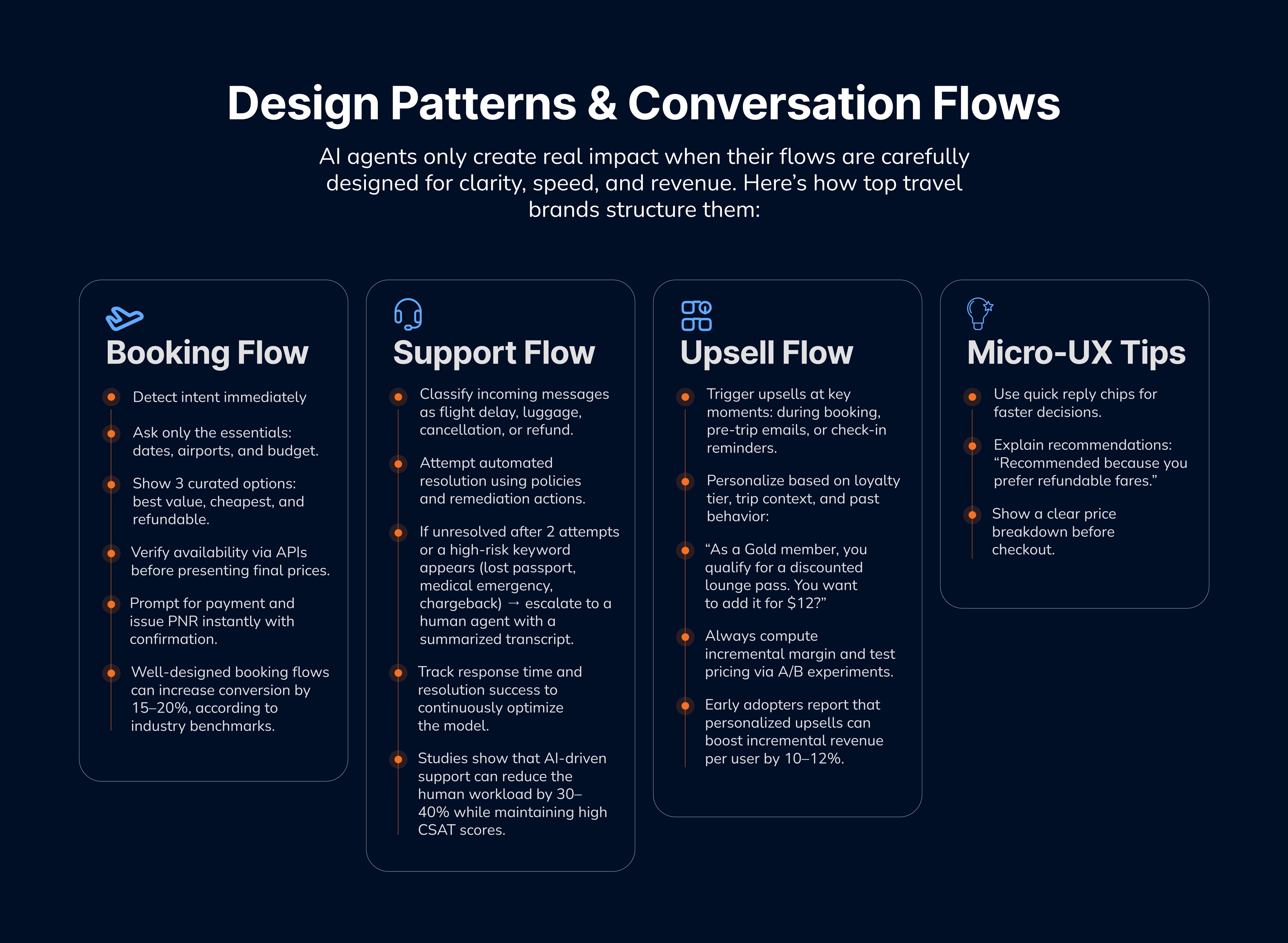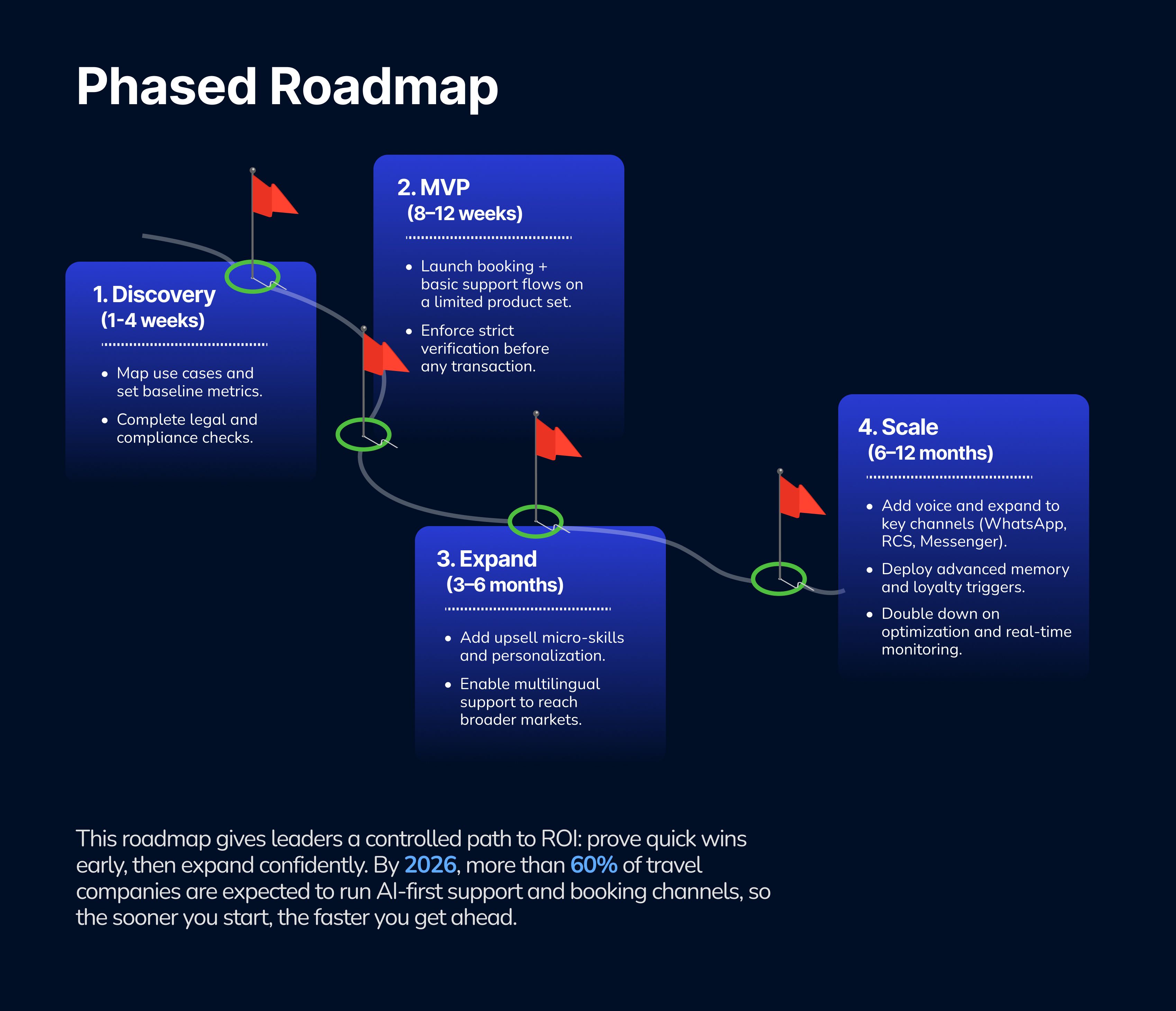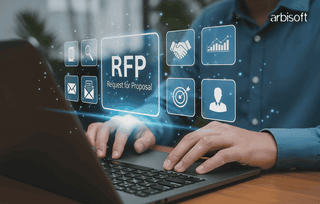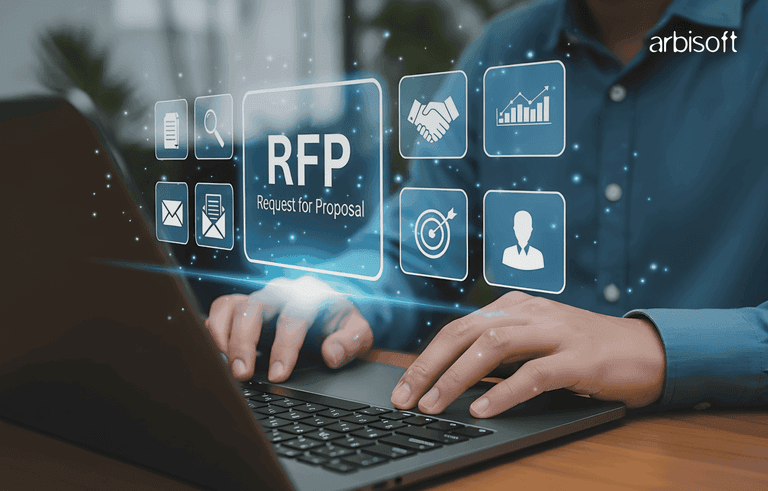We put excellence, value and quality above all - and it shows




A Technology Partnership That Goes Beyond Code

“Arbisoft has been my most trusted technology partner for now over 15 years. Arbisoft has very unique methods of recruiting and training, and the results demonstrate that. They have great teams, great positive attitudes and great communication.”
How to Implement AI Agents for Travel Booking, Support, and Upselling

Travelers aren’t waiting anymore. They want to plan a trip on WhatsApp at midnight, get instant rebooking during a flight delay, and add lounge access with a single tap. If you can’t deliver that level of speed and personalization, your competitor will.
That’s why the world’s biggest travel platforms are racing to roll out AI agents. These AI agents book trips, resolve issues, and increase revenue with perfectly timed upsells for Campaign Optimization and Audience Insights. And the numbers make it impossible to ignore: the AI in the tourism market is projected to hit $165.9 billion in 2025, while conversational commerce is exploding toward $25 billion by 2028.
This is where AI agents change the game. These are not just chatbots. They’re intelligent, specialized assistants that can search inventory, book trips, resolve issues, and recommend add-ons in real time. They work 24/7, scale globally, and never lose context. For travel market leaders, this means two things: lower operating costs and higher revenue per customer.
For travelers, the win is speed and relevance. For businesses, it has a measurable impact: higher booking conversion, more add-ons sold, and support costs cut in half. Leading OTAs and platforms like Booking.com and Expedia have already rolled out generative AI trip planners and support bots.
How Big is the AI Travel Market?
The AI in the tourism market is set to grow from $123.7 billion to $165.9 billion in just one year, showing how quickly vendors, OTAs, and suppliers are putting serious money into AI-driven features.
Leading platforms like Booking.com, Expedia, and Airbnb are already rolling out generative AI trip planners and support assistants. In 2025, they’re going further — embedding AI into booking engines, loyalty apps, and messaging channels to keep customers inside their ecosystem.
On the customer side, expectations are clear: speed, personalization, and 24/7 support. That’s why chatbots and AI-driven assistants are one of the fastest-growing commerce channels, with the global chatbot market expanding at 23.3% CAGR. Add conversational commerce to the mix, and the upside of in-chat booking and payments is too big to ignore.
For travel businesses, the payoff is straightforward:
- Lower support costs as AI agents deflect repetitive queries.
- Higher direct bookings by guiding customers through fast, contextual conversations.
- More revenue per traveler through personalized upsells and cross-sells.
Define clear business objectives & KPIs
AI agents only create value when they’re tied to measurable outcomes. The key is to connect each capability directly to the business levers that matter.
Booking agent
Your booking agent should be accountable for revenue.
- Track conversion rate from chat to confirmed booking.
- Monitor average booking value and completion time.
- Measure in-chat payment success.
Support agent
The support agent’s value is efficiency and satisfaction.
- Watch deflection rate (queries solved without humans).
- Track average handle time and cost per resolved ticket.
- Tie outcomes back to CSAT/NPS.
Upsell agent
This is where incremental revenue is created.
- Measure attach rate (add-ons per booking).
- Track conversion of personalized offers.
- Monitor AOV lift and incremental revenue per user.
Platform & growth KPIs
Zoom out to the business-wide picture:
- Overall revenue lift.
- CAC reduction through direct booking channels.
- Repeat-purchase rate and 30/90-day retention.
Conversational AI is already cutting service costs by up to 30% and lifting conversion rates by 20%+ for early adopters. With the chatbot market projected to hit $27.4 billion by 2030, the compounding ROI from lower costs and higher revenue streams will only accelerate.
Clear KPIs not only prove value but also guide scaling. Start with focused metrics, validate impact, then expand across booking, support, and upselling.
Architecture & Data Foundation
A high-performing AI travel agent isn’t just about plugging in a chatbot. It needs a layered architecture system for better scalablity where data, decisions, and safeguards work together. Here’s the roadmap every serious player should build on:
1. Customer & Context Layer
The agent should know who it’s serving in real time.
- Connect CRM, loyalty programs, and past booking history.
- Use device, session, and location signals to shape offers.
- Capture stated preferences (seat type, meal choice, preferred hotels).
This is how you move from generic responses to tailored journeys. McKinsey reports that personalization can lift revenue by 10–15%, and in travel, the stakes are even higher.
2. Operational Layer
This is your source of truth for bookings and money flow.
- Plug into airline and hotel APIs, GDS systems, and channel managers.
- Route transactions through booking engines and payment gateways.
- Integrate refund and change workflows.
Without this layer, an AI agent can’t transact - it can only talk.
3. AI Orchestration & Decision Layer
This is where intelligence meets control.
- Use an agent orchestrator to combine multiple micro-skills.
- Ground large language models with Retrieval-Augmented Generation (RAG) so answers reflect real policies and inventory.
- Enforce business rules: refund limits, legal compliance, loyalty tiers.
4. Monitoring & Observability
Trust is built on transparency and error control.
- Continuously reconcile quoted vs. authoritative prices.
- Run hallucination detection before output reaches the customer.
- Maintain transaction audit trails and fraud signal checks.
This is critical when mistakes can lead to regulatory issues or brand damage.
The non-negotiable rule: never let a language model claim availability or price without verifying it against the authoritative API. This one safeguard prevents costly errors, protects customer trust, and ensures compliance.

Personalization That Pays
Travelers want and expect offers and experiences that match their preferences, and AI agents make it scalable. Start simple with a hybrid approach: combine rules with lightweight machine learning.
- Use explicit signals like loyalty tier, family travel, or business traveler status to set sensible defaults.
- Layer embedding-based recommenders over session and context data to generate dynamic, relevant offers in real time.
Smart personalization ideas:
- Auto-preselect refundable options for high-value customers.
- Suggest experiential upsells like local tours for multi-day stays.
- Recommend fast, bookable transfers for late-arrival flights.
Always test. Run lift tests to measure lifetime value versus short-term attach rates. The goal is to grow revenue without hurting long-term retention.
Travel vendors using personalized AI have reported 10–15% higher booking conversion and 12% more incremental revenue per user. That’s why leading OTAs are investing heavily in personalization stacks and real-time context engines in 2025.
When done right, personalization increases sales and builds loyalty, trust, and a better traveler experience, giving market leaders a clear competitive edge.
Safety, Compliance & Trust
In the travel industry, trust is the foundation of every booking. If customers don’t feel safe, they won’t transact. Here’s how leading brands are building AI agents that travelers actually rely on:
Transparency first
- Always disclose: “You’re chatting with an AI assistant.”
- Show the exact action before it happens: “I will charge your saved card $245 to confirm this booking. Proceed?”
This clarity reduces errors and boosts customer confidence.
Human-in-the-loop where it matters
Automate the simple tasks, but route high-stakes ones. AI Agent smartly refunds over set limits, disputes, or legal issues than a trained human.
This balance keeps efficiency high without putting customer trust at risk.
Data protection by design
- Enforce PCI compliance for payments.
- Encrypt all personal data and respect local rules like GDPR and PDPA equivalents.
- With 83% of consumers saying they’re more loyal to companies they trust with their data, this is a competitive advantage.
Hallucination controls
- Never confirm prices or availability without verifying against authoritative APIs.
- Keep detailed audit trails for every transaction to protect both the traveler and the business.
This single step prevents costly errors and regulatory headaches.
Fairness & ethics
- Avoid personalization signals that cross ethical or legal lines.
- No discriminatory offers based on sensitive attributes. It offers only context that truly improves the traveler’s experience.
The market is clear: by 2026, over 70% of enterprises will require explainability and auditability in AI systems. For travel brands, getting safety and trust right is the difference between driving long-term loyalty or risking reputational damage.
Integrations & Partner Strategy
AI agents don’t create value in isolation. They need deep integrations with the systems that actually run travel. At launch, focus on the essentials:
- Booking and inventory APIs (GDS, direct airline and hotel APIs, channel managers).
- Payments and compliance plumbing, including PCI-ready gateways, refunds, and dispute handling.
- CRM and loyalty systems to personalize offers and rewards.
- Identity verification and fraud detection to protect transactions.
Instead of building every component from scratch, consider partnering with agent orchestration vendors or conversational commerce providers. They already have compliance, payments, and orchestration frameworks built. This means faster deployment and lower upfront risk.
The market is moving quickly. Major OTAs like Expedia Group and Booking Holdings have announced GenAI partnerships to accelerate their AI assistant capabilities. These alliances let them go to market faster while focusing internal teams on differentiation.
Travel companies that integrate AI agents with the right partner ecosystem can see 30–40% faster time-to-market compared to in-house builds, according to industry benchmarks. That speed is critical in a market where travelers are already using AI-powered assistants from platforms like Google and Airbnb.
For leaders, the strategy is clear: integrate the must-haves, partner where it accelerates, and keep your internal roadmap focused on the unique traveler experience that only your brand can deliver.
Measurement & a Simple Roadmap
AI agents only prove their value when they’re measured against the right outcomes. A clear dashboard is a must.

Risks & Mitigations
AI agents unlock speed and scale, but the risks are real. The good news: they’re manageable with the right safeguards.
Hallucinated bookings
Risk: AI “promises” inventory or prices that don’t exist.
Mitigation: Enforce API verification before committing and require a final confirmation step before charging. This prevents costly errors and protects customer trust.
Privacy & regulatory breaches
Risk: mishandling payments or sensitive documents.
Mitigation: design with privacy by default. Use PCI compliance for payments, encryption of PII, and strict limits on long-term storage. With fines for GDPR and equivalent laws climbing into the billions, this isn’t optional.
Trust erosion from poor upsells
Risk: pushing irrelevant or aggressive add-ons that annoy travelers.
Mitigation: monitor returns and sentiment by cohort, and keep upsells easy to decline or refund. Personalized, high-fit offers build loyalty; bad ones damage the brand.
Final Takeaway
AI agents are now a competitive necessity. Modern travelers expect instant answers, seamless bookings, and contextual offers without friction. If your brand can’t deliver that, someone else will.
The numbers make the urgency clear. The global AI in tourism market is projected to grow at over 15% CAGR. Travel chatbots alone are forecast to hit $3.9 billion by 2032, with year-on-year adoption accelerating. And major OTAs like Booking.com and Expedia are already rolling out AI-powered assistants that handle itinerary changes, upgrades, and upsells. This is setting new benchmarks for customer experience.
For leaders, the path forward is clear:
- Automate with trust. Build modular agents that verify every action against authoritative APIs before execution.
- Layer human oversight where it matters. High-value, high-risk moments should always allow for human review.
- AI-driven upsells, when personalized and well-timed, consistently lift conversions without eroding trust.
- Track performance by cohort, monitor customer sentiment, and use that data to refine the agent loop.
When done right, AI agents do more than cut costs. They unlock new revenue streams and deliver the kind of fast, tailored service that travelers now demand as standard. For market leaders, the question is more about how fast they can scale themselves before competitors leave them behind with the right AI development partner.
























